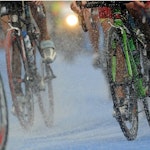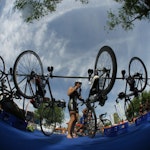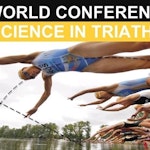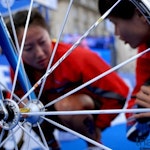The hottest topics in science and triathlon
Expect pacing, recovery and new technology to monitor performance to be the hot scientific topics in triathlon this year.
It’s just a week out from the first World Conference of Science in Triathlon and last week we heard from some of the keynote speakers on what they hope the first conference achieves in the future. But when it comes to short-term outcomes, what is it that the triathlon world is going to be speaking about right now?
So we asked them again, but this time focusing on what the average triathlon buff can expect to see in this year’s Dextro Energy Triathlon ITU World Championship Series and ITU World Cup Series. Both series also offer qualifying points for the London 2012 Olympics this season and given each and every elite triathlete will be pushing for every extra-second in an effort to make that Olympic field, a little scientific leg-up could help.
According to Dr Gregoire P Millet, from the University of Lausanne, pacing is set to be the most talked about tactic in the next two years. “Better understanding what factors trigger changes in pacing in this multidisciplinary sport is an important new field,” he said.
Dr Randall Wilber, Senior Sport Physiologist with the United States Olympic Committee, said to what happens after each race is equally crucial. “Using new technology to monitor recovery in elite athletes will be important,” he said.
And in New Zealand? Athletes can look forward to finding out more about the way their body responds to training and racing, but the best part is they will hardly even know it. Dr Paul Laursen, who is a sports scientist at AUT University and works with the New Zealand Academy of Sport, said the biggest change he would see this year is ‘new ways to non-invasively measure performance during training and racing.”
Of course this season is also all about London, with those priceless Olympic qualifying points on offer at every Dextro Energy Triathlon ITU World Championship Series, ITU World Cup and continental championship race. And the three speakers also have an insight into where those next Olympic medals will be decided.
Dr Wilber thinks it will be the use of cutting-edge technology to enhance performance while Dr Millet is of the opinion that periodisation, including altitude training, and pacing will be the key factors. Dr Laursen thinks it will be all about the final leg. “Quite simply, London success is going to come down to the ability to run like lightning after swimming and cycling hard,” Laursen said. “To do that is going to take a good pedigree, along with an intelligently designed training program. The biggest scientific issue for London then is how science will be used to guide training.”
More on the first Conference of Science in Triathlon can be found here.
Related articles
-
Scientists have their say on World Conference
The countdown to the first World Conference of Science in Triathlon is on. But what does it all mean? We hear from some of the keynote speakers on what they expect when they all head to the University of Alicante in Spain in a few weeks time.07:21 - 08 Mar, 2011 -
Programme for Alicante Science Conference released
The official run-down for ITU's first World Conference of Science in Triathlon has been released. Here is a quick look at who is talking about what as the best minds in sports science and triathlon descend on the University of Alicante in Spain.06:15 - 02 Mar, 2011 -
First World Conference of Science in Triathlon Conference
The first World Conference on Science in Triathlon is slated for 24-26 March in Alicante, Spain. Dr. Sergio Migliorini, Chair of the ITU Medical Committee, explains how the conference came about01:18 - 02 Feb, 2011 -
ITU World Conference of Science in Triathlon
World renowned coaches and physiologists are slated to speak at the first World Conference of Science and Triathlon this March in Alicante, Spain.01:00 - 27 Jan, 2011











